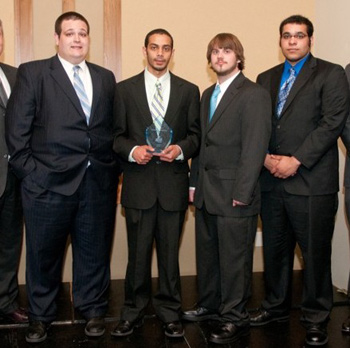 From Shenango to Schuylkill, Penn State University’s 19 branch campuses offer students the chance to stay close to home for a couple years before moving on to main campus in State College to finish their undergraduate degree and make their move toward a career.
From Shenango to Schuylkill, Penn State University’s 19 branch campuses offer students the chance to stay close to home for a couple years before moving on to main campus in State College to finish their undergraduate degree and make their move toward a career.
Four students at the Penn State-Hazleton campus are turning that well-worn model on its head. Niraj Pathak, Jesse Fox, Justin England and Amr Hosni form a quartet of Information Science and Technology majors who have already started their careers through their startup dubbed Innovatrix Labs. The foursome earned second place in the Great Valley Technology Alliance’s eighth annual Business Plan Competition in May for its network and end-user security delivery.
Their proprietary product, dubbed SAM (Security Assessment Manager) is an easy to use web-based tool that remotely conducts penetration tests. It’s basically an automated hacker running on a cluster of servers and presented in a tidy web interface that tells users what their vulnerabilities are and how they can fix them.
Pathak (Mountain Top), Innovatrix’s chief operations officer, and Fox (Drums), the chief knowledge officer, both hail from the Luzerne County, while England (Maryland) and Hosni (New Jersey) came to Hazleton from out of state. They’ve taken up space at the Hazleton CanBE incubator in Valmont Industrial Park at the request of serial entrepreneur Jack St. Pierre, and the guys are paying the bills by providing network security and web design consulting as it readies to launch SAM, hopefully by the end of the year. While they’re open to angel investors, they really have their sights set on government research grants. They’ve also been retooling their website, which should re-launch within days. Pathak talked with Keystone Edge about why the Innovatrix team has so much promise and the amazing support it has already received.
Keystone Edge (KE): So how did you guys start working together?
Niraj Pathak (NP) We’re all one or two years apart and we ended up in the same classes every semester. Most of the classes in our major have group projects and we worked well together. We had a Project Management class where we had to simulate a real-life business situation, working for a client and building a website, and we worked really well together in that class. We were putting the finishing touches on our site and we had a huge database failure two days before the project was due. We had 24 hours to rebuild the entire site from scratch. We just worked hard and got it done somehow. We really relied on teamwork and now it’s paying off big time.
We had this idea for our product we’re going to sell a couple years ago. We weren’t too serious about it at that point, but our advisor Barb Grayson recommended we enter it in the business plan competition. We entered and after that everything got a little more serious.
KE: What was the toughest part of Business Plan Competition?
NP: All 40 pages of it. We’re tech guys, not business guys. Our first draft was 1.5 pages, the worst thing ever. We showed it to some people and they told us we couldn’t hand it in. We got some help from Penn State’s Director of Academic Advancement who made it his goal to help us out. People also thought our financials were way off. We said we’d make $200,000 in a couple years and everyone was saying that was too low, that we were going to make millions and we should write it down. We find it hard to believe, but that was the biggest complaint about our plan.
We were very surprised when we found out we were finalists. There was dancing and smiling. At the banquet when we heard our name for second place, we were like “Oh my God we actually did it.” Second place, we still considered it a victory.
KE: How is SAM different and better than existing products?
NP: There are two major differences. Current security protection software like McAfee or Norton, that’s all reactive security. That won’t go off until you actually have a virus or something bad happens. The other difference, with the security tools hackers use, there are 1,000 tools they’d have to individually download and all of them have to be on that laptop. Our tool uses cloud computing to take the power of all these tools and put it in a single place. Think of gmail. That’s what we’re going for with security–simplicity and power. Cloud computing increases our server power. There’s a new attack and new vulnerability every day. For a single tech guy, that’s hard to keep up with.
KE: What’s Northeast PA like for a tech startup?
NP: Our office is right down the street from Penn State-Hazleton. Between classes we’re at the office, so this is pretty much our home base for now. Everyone we’ve met here, from faculty to staff and friends, has been great to us. Everyone seems to go out of their way to help each other and that’s kind of what I like about this branch campus.
We feel like this area is a hotbed for technology and it’s just waiting to explode. There’s so much room for growth. It’s unimaginable more people don’t see it as an area where they can be a part of the tech industry and succeed. There are so many avenues you can take. Since this is a smaller region, it allows you to help the community at the same time you’re doing business. That’s what it’s all about. If we get big, we’ll be able to hire people from outside the area to come here and work for us to really help the economy and community.
Joe Petrucci is managing editor of Keystone Edge. Send feedback here.
To receive Keystone Edge free every week, click here.
Photo: (from left) Justin England, Niraj Pathak, Jesse Fox, Amr Hosni



